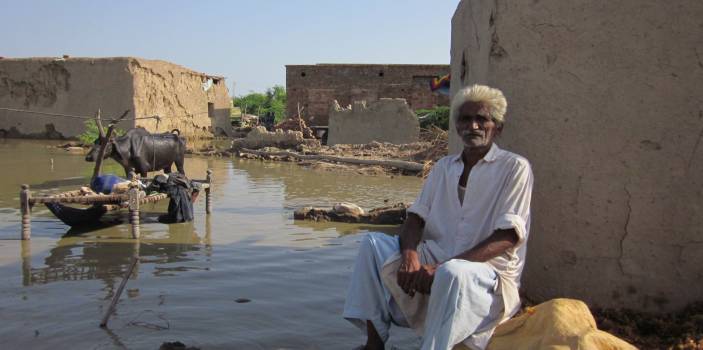
The Paris climate change agreement, the final pillar of the post-2015 agenda to be agreed this year, is deservedly being described as a historic pact, succeeding where others have failed.
It’s legally binding and, despite a huge range of opinions and agendas, 195 countries agreed to it. It represents a new kind of international legal instrument, looking to safeguard the rights of future generations through commitment to immediate collective action.
While the agreement is a necessary step to kick-start an urgent global response, there’s much to be done nationally.
Reducing emissions: ambitious but opaque
The agreement calls on governments to limit global warming to “well below 2C above pre-industrial levels, and pursue efforts to limit the temperature increase to 1.5C”.
The very mention of the 1.5C target is a huge achievement for the least developed countries that for years have been saying 2C will fail to prevent the worst impacts of climate change – floods, droughts, heatwaves and storms. However, it’s a soft commitment. The language isn’t concrete and it doesn’t include a timeframe to achieve the 2C target.
Similarly, there are no firm commitments to eliminating carbon emissions by 2050. The agreement talks about peaking greenhouse gas emissions as soon as possible but, again, doesn’t give a timeframe. It mentions reaching a balance between emissions caused by human activity and carbon offsetting, but potentially relies on technology that hasn’t been invented yet.
Even if all the targets to cap emissions are achieved, we’d still see a predicted global temperature increase of 2.7C. However, there are still opportunities to improve on this. Every country has an individual target that will be reviewed every five years to ensure the “well below” 2C target can be met.
Implications for older people
Even with a cap of 1.5C, it’s too late to avert the future impacts of climate change. It’s already affecting vulnerable groups such as older people, and this is only likely to increase.
Mitigation strategies will help us reduce the extent of global warming, while adaptation strategies will help us prepare for future global warming.
Adapting to climate change: an important focus but not age-responsive
No matter how much we cut emissions, people are already experiencing the impact of climate change and vulnerable people are bearing the brunt of it.
The final agreement commits to balancing funding for both preventative measures and adaptation strategies. It’s a positive step, but the nature of the funding is still unclear.
There’s a commitment in the agreement to adaptation strategies being gender responsive – a welcome and much needed measure. However, there’s no commitment towards other vulnerable groups. They are not homogenous. They encompass, women, older people, indigenous people, people with disabilities and many more, each with their own specific vulnerabilities, capacities, and requirements and priorities for targeted action.
Implications for older people
As we mentioned in our recent paper Climate change in an ageing world, we need age-responsive adaptation and disaster risk reduction strategies to reduce the impacts of climate change on older people. These include age-sensitive water management, resilient health services and projects to enhance food security.
Adaptation strategies contained within national commitments will need to be improved and funded.
It’s vital that revisions to nationally determined commitments and financing strategies reflect the need to be age-responsive in order to account for the world’s ageing population.
Loss and damage: an important achievement but no liability or compensation
It’s a tremendous achievement that loss and damage caused by climate change has its own section in the agreement. It acknowledges that no matter how successful mitigation and adaptation strategies might be, the most vulnerable communities are already experiencing the worst effects such as loss of life, livelihoods and land, and reduced access to food, water, services and infrastructure.
With this in mind, it’s particularly disappointing to see no liability or compensation mechanisms within the agreement.
Implications for older people
On a positive note, support will be given to “minimising” and “averting” loss and damage through disaster risk reduction strategies, early warning systems and emergency preparedness. These need to be accessible and targeted if they are to succeed. It is essential that early warning systems and preparedness plans are age and disability responsive.
Other strategies needed to avert losses for older people such as social protection mechanisms and food and nutrition initiatives to support displaced people must be given priority.
Human rights: Weakened and not older people inclusive
A provision to protect human rights was included in an early draft but it was weakened throughout the negotiations, eventually being removed as a binding commitment and relegated to the non-binding introductory sections of the agreement.Although the rights of women, children, people with disabilities and indigenous groups are all specifically referred to within the opening paragraph of the agreement, the rights of older people are missing from the text.
Implications for older people
Given the disproportionate impact that climate change has on older people, which will grow due to worsening impacts and an ageing population, this is a missed opportunity. It is vital that national strategies address this if they’re to be effective.
What next?
What happens next in terms of revising countries’ commitments will be crucial to the success or failure of the framework.
All states signing the agreement have had to commit to reviewing and revising (and increasing) their commitments to show progress every five years.
It will be important to ensure the national adaptation, mitigation and loss and damage strategies included within the targets are age-responsive.
Our position paper Climate change in an ageing world provides some recommendations on how this can be achieved.
